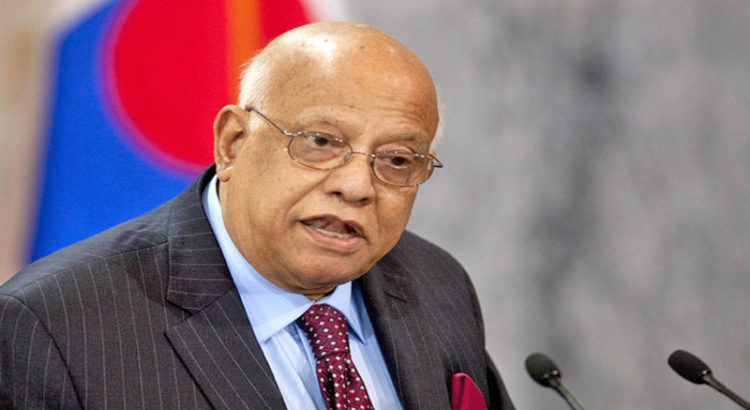Asia/Bangladesh/thedailystar.new/Wasim Bin Habib
Resumen: Aunque el gobierno ha aumentado las asignaciones presupuestarias para el sector de la educación en los últimos años adjuntando la máxima prioridad a la misma, la asignación sigue siendo insuficiente para garantizar una educación de calidad. Se debe a que una gran parte del presupuesto de educación se gasta en fines no de desarrollo, principalmente para los salarios de los profesores, lo que deja poco margen para la inversión en educación de calidad. En su discurso sobre el presupuesto, el ministro de Finanzas AMA Muhith propone una asignación de 50.432 millones de rupias Tk en el presupuesto para el año fiscal 2017-18 para el sector de la educación, el aumento de la asignación de alrededor de un 14 por ciento desde el año fiscal saliente.
Although the government has increased budgetary allocations for the education sector over the years attaching top priority to it, the allocation is still inadequate for ensuring quality education.
It is because a large portion of the education budget is spent on non-developmental purposes, mainly for teachers’ salaries, leaving little scope for investing in quality education.
In his budget speech, Finance Minister AMA Muhith proposed an allocation of Tk 50,432 crore in the budget for 2017-18 fiscal year for education sector, raising the allocation by around 14 percent from the outgoing fiscal year.
The amount is 2.2 percent of the GDP (gross domestic product) and 12.6 percent of the total outlay.
In the revised budget of the previous fiscal year, the allocation for education was Tk 44,260 crore.
The finance minister yesterday set aside an allocation of Tk 28,410 crore for the two newly created divisions under the education ministry and another Tk 22,022 crore for the primary and mass education ministry.
Of the proposed allocation, the proposed non-development expenditure is Tk 34,676.
The size of the national budget is increasing every year; the budgetary allocation to the education sector also rises. But the share of the education budget has been remaining almost static over the years, both as percentage of GDP and as a share of total outlay.
In the last six years since 2011, the rise of allocation has been hovering around 10 to 12 percent except that of last year when the jump was over 14 percent, according to the budget documents.
The ratio of education budget to GDP stood around two percent over the last 15 years, which is lower than that of many other Asian countries, like Vietnam and Nepal.
Bangladesh committed in the Dakar Declaration in 2000 and other global forums that it would spend 6 percent of the GDP or allocate at least 20 percent of the national budget for education. The Unesco also stipulates that the budgetary allocation for education should constitute at least 6 percent of the GDP and 20 percent of the total budget.
Against such a background, educationists said Bangladesh should invest more in education, especially in quality education, if it wanted to change its future and achieve the goals set in the National Education Policy 2010 and Vision 2021.
«It is not possible to ensure quality of education with this amount. The government expenditure on education has to be increased,» Manzoor Ahmed, professor emeritus of Brac University, told The Daily Star over phone yesterday.
Although the government repeatedly promises to raise the allocation, but it does not do so as per expectation. The budgetary allocation for education is quite low compared to other South Asian countries, he added.
«We have been observing that the allocation remains almost at the same level.»
As per the international benchmark, the allocation in the education sector should be 20 percent of the total budget, said Manzoor.
«Setting the 20 percent allocation as our target, the government should increase the allocation every year,» he added.
NEW PLANS FOR PRIMARY AND SECONDARY EDUCATION
In his budget speech, the finance minister said they planned to build ICT-based interactive classrooms at 503 model primary schools to enhance both capacity and quality in primary education.
Besides, the government planned to undertake two projects at a cost of Tk 14,864 crore to create appropriate learning environment at the primary schools, he said.
Stressing the need for developing quality of secondary education, he said a five-year long project titled «Secondary Education Development Programme» is being undertaken with an estimated cost of $18.2 billion.
«However, we need to recognise that improvement of quality of education will take some time,» he said.
Muhith said the government was initially focusing on expanding the opportunities for education. «Our next priority is to build a pool of trained teachers,» he said.
FIVE NEW UNIVERSITIES
The finance minister said the government would strengthen its efforts to set up five new public universities.
«It may be mentioned here that the law regarding setting up of five universities has been enacted, while the projects for constructing the physical infrastructure for three universities are at the approval stage,» he said.
Stay updated on the go with The Daily Star News App. Click here to download it for your device.
Fuente: http://www.thedailystar.net/Bangladesh-Budget-2017-18/frontpage/still-not-enough-quality-education-1414294
Imagen tomada de: http://www.theindependentbd.com/assets/news_images/Finance-Minister-AMA-Muhith5.jpg








 Users Today : 219
Users Today : 219 Total Users : 35403192
Total Users : 35403192 Views Today : 265
Views Today : 265 Total views : 3332438
Total views : 3332438